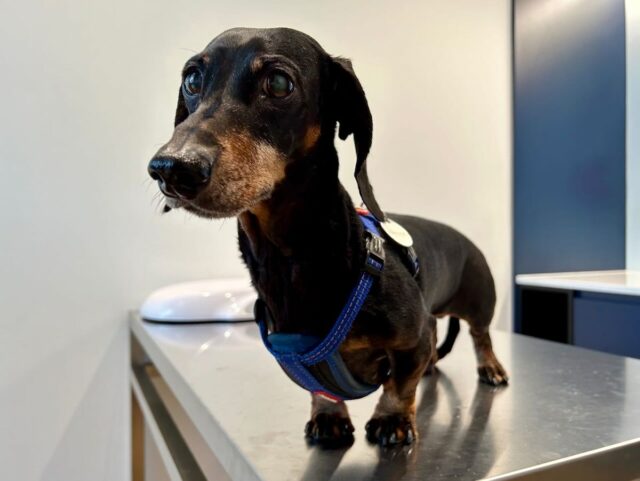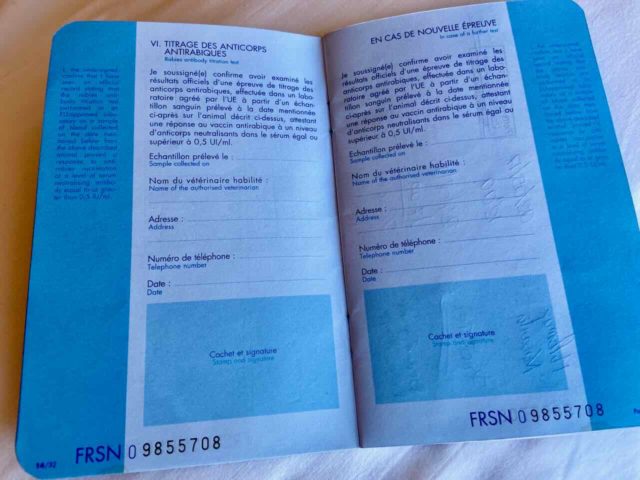Before you head off travelling with your dog, or relocate with them across the world, you likely have a long list of preparation steps. Steps such as checking their rabies vaccination, getting a health certificate and researching pet-friendly transport options. But there’s one extra step you may require or should consider: a rabies titre test (or rabies titer test) for your dog.
If you’re heading to Europe or Australia and a handful of other countries, depending on your current country, your dog may require a rabies titre test. Additionally, if you’re currently in Europe or Australia and travelling abroad with your dog, it can also be a good idea to get a rabies titre test done before departing. Find out more about which countries require rabies titer test.

What is the Rabies Titre Test?
Often the only proof you need that your dog is immunised against rabies is a rabies vaccination certificate, filled in by your vet when they vaccinate your dog. However, sometimes further proof is required: a rabies titre test (or rabies titer test).
The rabies titre test is also known as the rabies antibody test, rabies neutralising antibody titre (RNAT) test or rabies blood test, as it measures the amount of antibodies produced in the blood of your dog to rabies. It confirms the effectiveness of the rabies vaccine in your dog.
How is the Rabies Titre Test Performed?
The rabies titre test is performed by taking a small sample of blood from your dog, after they have been immunised for rabies. A certain period of time needs to have elapsed, generally around a month. (The exact time period varies depending on the particular regulations you are complying with.)
The blood sample needs to be taken by an authorised veterinarian, then sent away to a laboratory. The laboratory will test the level of neutralising antibodies to the rabies virus in the serum. Shortly after your vet will receive a lab report stating the level of antibodies to the rabies vaccine in your dog.

A minimum level of antibodies is required for a valid rabies titre test. Usually a level of 0.5 IU/ml or greater is acceptable, to prove that your pet is immunised against rabies.
Occasionally, a dog may fail the rabies antibody titre test, despite having been vaccinated for rabies. In this case, either a second test may be performed (in case sufficient time hadn’t elapsed after the vaccination before the test was performed) or more generally a booster rabies vaccination is given, then a second rabies titre test performed.
In the case of tests done in Europe, there is a page in your EU pet passport for valid test results to then be recorded by the veterinarian.

Does Your Dog Need a Rabies Titre Test to Travel to Europe?
If you’re travelling to the EU from outside of the EU (or just transiting through the EU and need to pass through customs), your dog may need a rabies titre test to firstly be performed.
This depends on the country that you are travelling to the EU from. There is a list of countries that are exempt from this requirement, including the USA, Canada and Australia. The full list of exempt countries are listed on this page.
If your dog requires the rabies antibody test to travel to the EU, it must be done at least 30 days after your pet has been vaccinated for rabies, and at least 3 months before your pet travels to the EU. This means the total preparation time to take your pet to the EU is at least 4 months.

The approved rabies serology laboratories for dogs travelling to the EU are listed here, both within and outside the EU. Note that once your pet has had a satisfactory result, the test doesn’t need to be repeated as long as your pet stays up-to-date with their rabies vaccination.
For other countries in Europe outside of the EU, check with the individual country regulations for which countries require rabies titer test. Many other countries have similar regulations.
Consider a Test Before Leaving the EU to Travel Around Europe
One of the great things about travelling around Europe with a dog that it’s so easy from an administrative view. Usually no vet visits or certificates are required moving from country to country.
But this only applies if you remain within the EU and some related countries. If you leave this group of countries and then return to the EU, you’ll need to re-review the paperwork requirements to enter the EU with your dog.
In particular, there are a few countries within Europe, with a higher incidence of rabies, where you’ll need a rabies titre test to re-enter the EU. This currently applies for: Albania, Moldova, Montenegro, Serbia, Ukraine and Turkey. (Double-check the current list of exempt countries on this page.)

This applies even if you’re just briefly driving through these countries, such as on your way from Italy to Greece.
Now, according to the EU regulations, if you wait until you enter these countries and then get a rabies antibody test, you need to wait 3 months before your pet is permitted to re-enter the EU. The better option is to get a rabies antibody test before leaving the EU, whether at home or somewhere along the way (but still in the EU).
As long as the test is carried out and documented in your EU pet passport, with a favourable result, before your pet leaves the EU, there is no waiting period.
So, if you’re travelling around Europe with your dog and there’s a chance you’ll visit one of these countries, consider getting a rabies titre test for your dog now.
Consider a Test Before Leaving the EU to Travel Around the World
Just as you’ll need a rabies titre test to return to the EU from some countries within Europe, this is also the case if you’re travelling to many other countries around the world with your dog. In particular this applies for many developing countries in the world.
For example, if you are travelling to Asia with your dog, currently the only Asian countries or territories where your dog doesn’t need a rabies antibody test to return to the EU are Bahrain, Hong Kong, Japan, Malaysia, Singapore, Taiwan and the UAE. The list of countries currently exempt from this rule are listed here.

Now, you may be travelling to Asia for an extended period (or indefinitely), but it’s still a good idea to get a rabies titre test. For instance, circumstances can change, and you may want to return to Europe quickly.
If you get a rabies titre test as part of your return preparations, you’ll have to wait 3 months before travelling back to the EU. If you had completed the test before leaving, you can immediately fly back, as long as your pet’s rabies boosters have been done before the last vaccination expired.
Additionally, the more difficult aspect is you’ll need to have the test performed by a laboratory recognised by the EU. The approved laboratories are listed here. There may not be a recognised laboratory in your country of residence, and it may be difficult to organise, due to rules on posting blood samples, not to mention expensive.
It’s easier to get the test before you leave and keep your dog’s rabies vaccines up-to-date. (Although any overseas boosters should be certified separately, not in your dog’s EU Pet Passport.)
Read about about this dog’s experience travelling from Thailand to Europe
What About Travelling Overseas from the US?
If you’re from the US and are travelling to Asia or Africa with your dog, it’s also a good idea to have the rabies titre test done for your dog.
Since July 2021, the rules for travelling with a dog to the USA from a high-risk country for rabies have changed. If your dog was vaccinated for rabies before leaving the USA and the vaccine is still valid, the steps are relatively simple.

However, for dogs most recently vaccinated against rabies overseas, a CDC Dog Import Permit is required, if you want to avoid your dog being quarantined on your return. This permit requires the performance of a rabies titre test at least 45 days before entry to the USA.
There’s also a chance you may take a flight that transits through Europe, in which case you may need to fulfil the requirements to enter the EU with your dog.
Does Your Dog Need a Rabies Titre Test to Travel to Australia?
Dogs travelling to Australia usually require a rabies neutralising antibody titre test, with a far shorter list of exempt countries.
The only exempt countries are the Group 1 and 2 rabies-free countries, as listed in the step-by-step guides. They are mainly islands and include New Zealand, Hawaii, Japan, and Singapore.
All dogs that have visited Group 3 countries (or any of the unapproved countries) require a rabies titre test as part of the long preparation process. Note that this includes all countries in the EU and mainland USA. If your pet has visited one of these countries, it requires the rabies titre test.

While the test can be done anytime from 3-4 weeks after the rabies vaccination, the waiting period is even longer: 180 days until your dog can be exported to Australia. Plus it must have been done a maximum of 12 months (or 365 days) before your dog is exported.
Consider a Test Before Travelling Overseas from Australia
Before I headed overseas from Australia with my dog to travel to Europe, I technically only needed to have my dog immunised for rabies, as well as complete the standard paperwork. However, I also had the rabies titre test performed on my dog, just before I flew out.
This is because all dogs and cats travelling to Australia, except for those that have only visited a short list of rabies-free countries, need to have the rabies titre test done at least 180 days before the date of import to Australia. This means that most animals travelling to Australia take a very long time to prepare (at least 7 months), simply due to this one waiting period.
However, if you have the rabies titre test done before leaving Australia (and keep your pet’s rabies vaccination up-to-date), there is no waiting period, if you return within a year (the validity period for the test for the Australian authorities). (Up until March 2023, this was two years, but unfortunately the validity period has been reduced.)

This means if you’re overseas for a period less than 7 months or you need to quickly organise your return (if your circumstances change), you can complete the entire preparation in under two months. (Note that for the purpose of entering Australia, only a rabies titre test within the last year can be used.)
The other benefit from having a rabies titre test done on your pet before leaving Australia, if the test is conducted at the Australian Animal Health Laboratory, is that the process to apply for an import permit is simpler. You don’t need to get an RNATT declaration completed by the official government veterinarian in the country of export and attach it to your permit application, as covered on this page.
And considering how complex the process is to prepare your pet to return to Australia, every step you can skip is welcome!
Read more about the steps to export your dog from Australia, plus my experience returning to Australia with my dog, including all the steps we were required to complete
What Other Countries Require a Rabies Titre Test?
There are a number of other countries in the world with strict import rules for pets that require a rabies titre test for dogs. These countries may include New Zealand, Singapore and Japan.

You May Also Like
- Taking Your Dog to Europe: Vaccines & Paperwork
- How to Bring a Dog to the USA: Vaccines & Paperwork
- Bringing a Dog to Australia: My Experience
About the Author

Shandos Cleaver is the founder of Travelnuity: Dog-Friendly Travel. She has travelled extensively with her Miniature Dachshund, Schnitzel, including to 33 countries across Europe, every state and territory of Australia except Tasmania, and 10 of the United States. She’s passionate about providing inspiration and information to others wanting to travel with their dogs, whether close to home or internationally.
Inspired? Pin this to your Pinterest board!


Hi Shandos, How long after the rabies vaccine did your dog get the RNAT test in Australia?
Ive read some sites that say it should be at least 21 days and others at least 30 days. Im preparing things for my pug in case we move back to Europe and things dont work out and we have to return to Australia
Looking at my paperwork, we had the rabies vaccine on the 9th January and the titre test blood sample on the 10th February, so it was 32 days for us.
The Australian government don’t actually have a minimum number of days to wait, they just recommend 3-4 weeks (about the only step without strict dates!) But our vet mentioned that the longer you leave it, the more time for antibodies to develop, so if you can wait at least 30 days it would be ideal. (If there are insufficient antibodies, the option is to either retest, or else to vaccinate again and retest.)
Additionally, if you need a rabies titre test result during your travels in Europe (such as if you visit some of the non-EU countries in Eastern Europe, you need the result to return to the EU), the rabies titre test from Australia should be recognised. But the EU rule is the test has to be at least 30 days after the vaccination. Another reason to wait at least 30 days.
Rabies titer tests are unbelievably expensive here in California. I’ve been calling around and getting quotes in the range of US$300-$500.
They send their blood samples mostly to the same lab in Kansas, which (according to its ads aimed at veterinarians) charges them $90. I’m puzzled at how, despite the presence of many competing veterinarians, such a big price markup can be sustained.
I had to get some blood tests in the USA before taking my dog home to Australia, and also found them expensive. The prices are slightly cheaper in Australia, but I generally found vet costs so be cheaper in Europe.
Best of luck with your preparations and commiserations about the costs!
While the test can be done anytime from 3-4 weeks after the rabies vaccination, the waiting period is even longer: 180 days until your dog can be exported to Australia. Plus it must have been done a maximum of 24 months before your dog is exported.
Hi Shandos, we are just preparing our dog for a trip to Australia from Asia. We were told that the wait after the titre test was 180 days. I’m a bit confused what is the 24 months mentioned above referring to?
Sorry that it’s not that clear. Basically, the rabies titre test “expires” after 24 months for the purposes of importing a pet to Australia. (In many other parts of the world it never expires.) If the test was done more than 24 months, it can’t be used, and you need to have it re-done and wait the 180 days.
Hi! Thanks for the good info. What I am still scratching my head about it, is why European union countries require three months waiting time after satisfactory test results? What is the point of the waiting period? Why do we have to wait three months? What happens in that waiting time that makes the dog any different from the moment we get satisfactory test results?
This is to see if your pet in the meantime develops clinical signs of rabies, which it is not possible to detect earlier, but it may have caught prior to being vaccinated. Australia actually has a 180 day waiting period, claiming it can take up to 6 months for a pet to develop rabies symptoms. They explain in more details in their FAQ: https://www.agriculture.gov.au/cats-dogs/frequently-asked-questions#why-do-i-have-to-wait-180-days-after-the-rabies-antibody-testing-before-i-can-import-my-dog-or-cat
How much does the test usually cost approx, in Bangkok? I just got quotes 15000 per dog.. which seems extortionate!!! I want to take my dog back to the UK as we are giving up living here in Thailand and moving back there… and can’t bare to leave our 3 chihuahua dogs behind….BUT, we would really have to struggle to find that money!!!
I recommend reading this guest post: https://www.travelnuity.com/travel-with-dog-thailand-to-europe/. It cost them 8000 baht for one dog, going through a pet travel company, but that was a few years ago.
Hey, very interesting post.
Did you or your vet enter the anti-rabies titre test to your dog’s EU Passport?
Who signed that page? I just have a sheet of paper with the certificate but I wanted to enter the details to his passport to avoid carrying this separate document.
I never had it entered into my dog’s EU Pet Passport, mainly as I only needed it for returning to Australia, and I needed the original certificate for that. I would speak to your vet about entering the details.